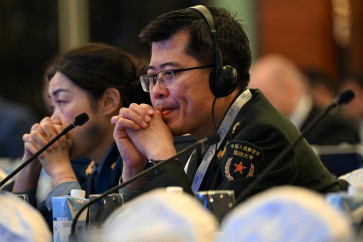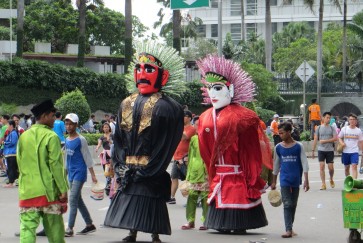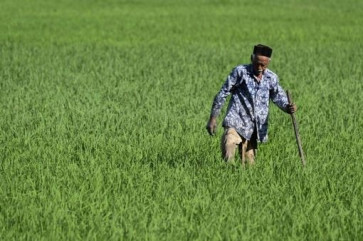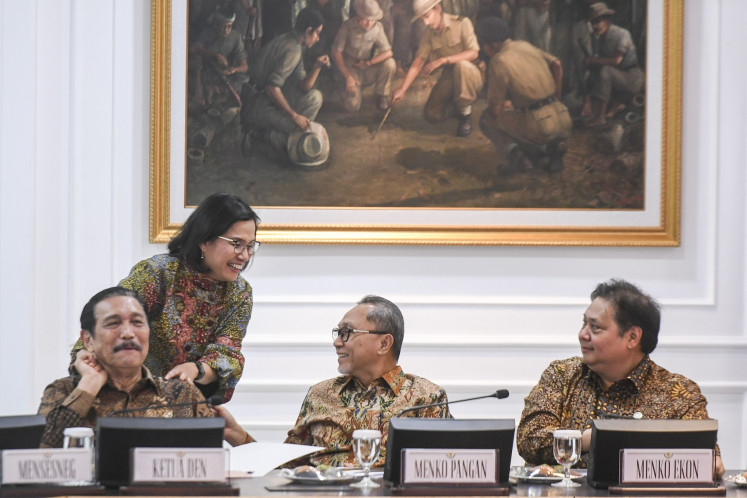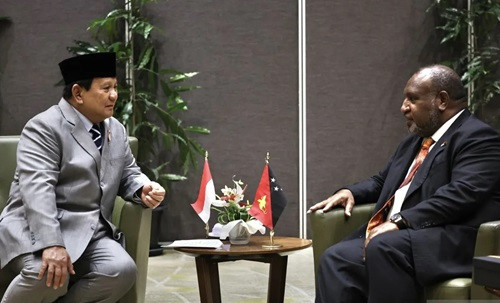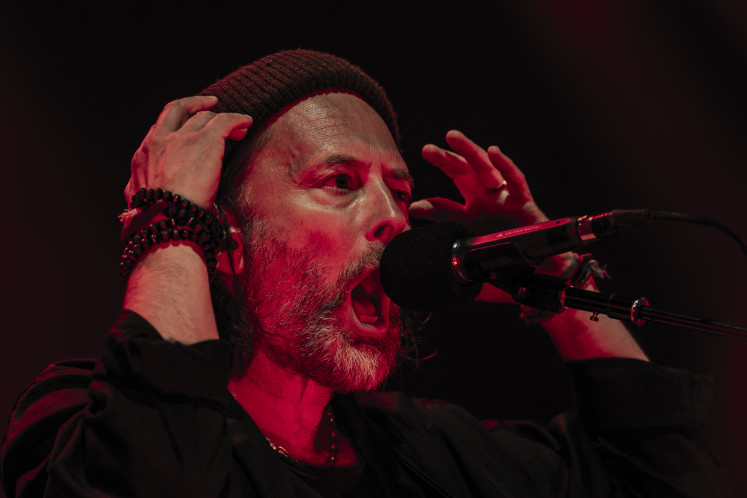Resolving the tragedy of 1965: Mission impossible?
Written testimony: Sri Sulistyawati, a former activist of the Indonesian Womenâs Movement (Gerwani), the womenâs wing of the now defunct Indonesian Communist Party (PKI), reads letters of testimony from people who fell victim to the backlash following the abortive Sept
Change text size
Gift Premium Articles
to Anyone
 Written testimony: Sri Sulistyawati, a former activist of the Indonesian Womenâs Movement (Gerwani), the womenâs wing of the now defunct Indonesian Communist Party (PKI), reads letters of testimony from people who fell victim to the backlash following the abortive Sept. 30, 1965 coup, blamed on the PKI. The letters were compiled by the Commission for Missing Persons and Victims of Violence (Kontras).(JP/Nurhayati) (Gerwani), the womenâs wing of the now defunct Indonesian Communist Party (PKI), reads letters of testimony from people who fell victim to the backlash following the abortive Sept. 30, 1965 coup, blamed on the PKI. The letters were compiled by the Commission for Missing Persons and Victims of Violence (Kontras).(JP/Nurhayati)
Written testimony: Sri Sulistyawati, a former activist of the Indonesian Womenâs Movement (Gerwani), the womenâs wing of the now defunct Indonesian Communist Party (PKI), reads letters of testimony from people who fell victim to the backlash following the abortive Sept. 30, 1965 coup, blamed on the PKI. The letters were compiled by the Commission for Missing Persons and Victims of Violence (Kontras).(JP/Nurhayati) (Gerwani), the womenâs wing of the now defunct Indonesian Communist Party (PKI), reads letters of testimony from people who fell victim to the backlash following the abortive Sept. 30, 1965 coup, blamed on the PKI. The letters were compiled by the Commission for Missing Persons and Victims of Violence (Kontras).(JP/Nurhayati)
W
span class="caption">Written testimony: Sri Sulistyawati, a former activist of the Indonesian Women's Movement (Gerwani), the women's wing of the now defunct Indonesian Communist Party (PKI), reads letters of testimony from people who fell victim to the backlash following the abortive Sept. 30, 1965 coup, blamed on the PKI. The letters were compiled by the Commission for Missing Persons and Victims of Violence (Kontras).(JP/Nurhayati)
'My life has been a mess since the events of 1965,' said Barjo, a survivor of a communist purge that killed nearly 500,000 people in different parts of Indonesia in 1965. For his alleged involvement with the Indonesian Communist Party (PKI), Barjo was assaulted, arrested, separated from his family for years without trial.
Fifty years have passed, yet Barjo's suffering goes on. After living with the stigma of being a former political prisoner for decades, the 85-year-old suffers from discrimination even now and has no ID card.
At his earth-floored shack in Purwodadi, Central Java, he told The Jakarta Post that he had eventually, in despair, decided to live without state recognition.
Stories like Barjo's can be found across the country, particularly in Bali and Central and East Java, which saw the worst massacres of communist-affiliated individuals.
Victims have demanded that the state acknowledge the massacres, issue a formal apology and give compensation. Many have died without seeing justice.
But the fight for justice goes on regardless. A surge of younger people whose families suffered in the tragedy has given fresh wind to the struggle, buoyed by the Internet and changes in the country's political sphere.
One such new campaigner is 44-year-old Soe Tjen Marching. She only discovered her family's tragic past after former president Soeharto, a key figure implicated in the 1965 tragedy, stepped down.
'My father was detained from 1966 to 1968. ['¦] He never told me, perhaps because he was traumatized. He died in 1998, a few months after Soeharto quit. Soon after that, my mother was brave enough to tell the truth,' Soe Tjen said in an email.
Based in London, Soe Tjen has become a strident advocate for victims' families. She represents a new generation of the victims that uses technology to seek the truth behind the 1965 tragedy and obtain justice for their families' suffering.
Before 1998, there was only one version of events to explain the 1965 killings ' the government's version. But that monopoly on truth has been challenged by the dawn of the digital era and the concurrent widening of access to information, including information that challenges state propaganda.
The distribution of eye-opening documentaries The Act of Killing and The Look of Silence by US filmmaker Joshua Oppenheimer on YouTube has contributed to the rise of alternative narratives regarding the 1965 tragedy, triggering fresh demands at both the national and international level for a resolution of the crimes committed.
Bowing to these changes in politics and society, the government has issued a set of initiatives and promised to investigate the 1965 purge. The government's attitude has become significantly more open to discussion since the fall of Soeharto, the Institute for Policy Research and Advocacy (ELSAM) has noticed.
'It began with the Reform Era. The People's Consultative Assembly issued a decree on human rights in 1998 after the Soeharto administration collapsed ['¦] the decree became the basis for the deliberation of the 1999 law on human rights,' senior ELSAM researcher Wahyudi Djafar said.
Since then, a set of new regulations has been issued and promises have been made, but no progress has been seen so far. New hope emerged under the administration of President Joko 'Jokowi' Widodo, who has made the settlement of past human rights abuses, including the 1965 communist purge, a priority of his agenda.
However, the hopes were crushed by the President himself; in a recent closed-door meeting with the country's second-largest Muslim organization, Muhammadiyah, Jokowi said that he would not issue an apology to victims of the purge and their families, a step deemed crucial in resolving the case.
Lacking political support from the government, attempts to uncover and resolve the human rights violations during the 1965 tragedy appear to be an impossible mission. Legally, there are two avenues: court trials and reconciliation efforts. Neither solution, though, is feasible without serious and high-level political support.
Bringing the case to court was implausible, said Giri Ahmad Taufik of the Indonesian Center for Law and Policy Studies, citing technical difficulties.
'Many perpetrators have died, witnesses can't be found and there is no evidence,' he said.
The amount of time passed since the events is a major stumbling block. Based on the non-retroactive principle upheld in the revision of the 1945 Constitution, the 1965 case cannot be tried, as the relevant laws were issued long after the abuses occurred, unless the House of Representatives endorses the formation of an ad hoc human rights court.
Looking at the current political composition at the House, with many army generals implicated in past human rights abuses controlling political parties, such an endorsement looks very unlikely.
A plea from the National Commission on Human Rights (Komnas HAM) to the government and the House to establish an ad hoc court to try the 1965 crimes was rejected in 2012. The commission, prior to making the plea, issued a 1,200-page report declaring the 1965 purge a gross human rights violation.
Bringing the case to an international court is also considered impossible, as Indonesia has not ratified the international human rights convention governing the International Criminal Court, known as the Rome Statute.
Reconciliation efforts, the other avenue, are mandated by the 2000 law on human rights courts, which states that reconciliation is a non-judicial initiative that requires truth-seeking efforts involving the state issuing an official expression of regret and an apology and initiating reconciliation efforts.
This approach, though, appears to be another non-starter, as the law that mandates the establishment of a truth and reconciliation commission to oversee reconciliation efforts has been annulled by the Constitutional Court.
The court, after the annulment, suggested two alternatives for the state to solve past human rights cases: form a new law or issue a presidential decree to form an ad hoc committee charged with looking into the abuses.
However, these two alternatives are also unworkable in light of the House composition and the government's reluctance to begin a process of reconciliation. Cabinet Secretary Pramono Anung has blamed the current global economic turmoil for the government's decision to abandon its commitment to solving past human rights abuses.
Apart from technical legal difficulties, many believe that reconciliation, because of the range and nature of parties involved, is simply too complicated a process.
The Post has learned from a number of interviews that victims and their families are, moreover, not united in their aims and desires regarding reconciliation. Soe Tjen, for example, wants justice to be upheld in court and for the true history of the 1965 government atrocities to be revealed. Barjo, on the other hand, would be content merely with state acknowledgement of the violence and oppression.
Representing another group of victims, Nani Nurrachman Sutojo, the daughter of slain Maj. Gen. Sutojo Siswomiharjo, believes that straightening the history should be a priority of any reconciliation process to prevent future conflict.
'If what happened in the past is not resolved, then future disagreements risk degenerating into violence,' she said.
However, Amelia Yani, the daughter of national hero and late former Army chief Gen. Ahmad Yani, who was allegedly killed by the PKI, takes a different stance on the matter. She rejects the notion of a state apology, insisting that the sole aim of reconciliation is the restoration of victims' rights to allow them access to public services.
Other victims have demanded compensation from the government in exchange for the mistreatment to which they were subjected. The government, however, has stated that it cannot afford to provide compensatory cash to all victims of the events of 1965.
Despite the apparent hopelessness of resolution efforts, new initiatives have been introduced and old initiatives revived to provide justice to victims of the purge. The most significant revived initiative involves grassroots movements to promote reconciliation between victims and perpetrators at the local level.
ELSAM has recorded such culture-based reconciliation efforts in Central Java and Central Sulawesi. Under this approach, local communities organize meetings between victims and perpetrators to discuss the past and move toward reconciliation.
Similar efforts have been carried out by the Silaturahmi Anak Bangsa Forum at a higher level, gathering descendants of key figures from all sides of the 1965 events to initiate dialogues.
Nani, one of the forum's founders, believes that such community-based initiatives are more effective than formal legal approaches dominated by state officials and activists.
'[The matter] has to be resolved, not with a political approach, but with psychological and anthropological approaches,' said Nani, who lectures in psychology at Atmajaya University in Jakarta.
Another initiative, meanwhile, is attempting to bring the case to the international court. A group of human rights activists led by lawyer Nursyahbani Katjasungkana has initiated an International People's Tribunal on 1965 crimes to be held in The Hague, the Netherlands, in November.
'We want to earn national and international recognition of the genocide and crimes against humanity committed in and after 1965 by the state,' Nursyahbani said.
However, many legal experts have disparaged the move, as no ruling issued by the tribunal would be binding in Indonesia.
The initiative had also drawn skepticism at the grassroots level, ELSAM's Wahyudi stated. 'The fact that the tribunal will take place in the Netherlands has raised some questions, as the country colonized Indonesia for centuries.'
Indonesia, then, seems to be drawing no closer to reconciliation. Under newly appointed Coordinating Political, Legal and Security Affairs Minister Luhut Binsar Pandjaitan, no meetings have been scheduled to discuss the matter, according to Wahyudi.
Amid the wrangling, debate and uncertainty, one big question remains: After 50 years, when will Barjo, Soe Tjen and the other victims of the 1965 atrocities obtain justice?

